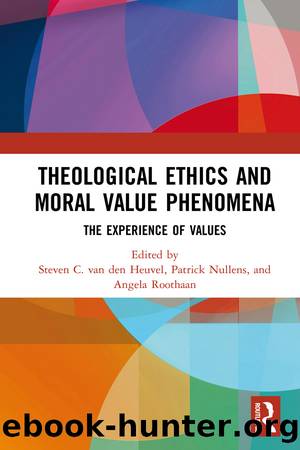Theological Ethics and Moral Value Phenomena by van den Heuvel Steven C. Roothaan Angela. Nullens Patrick

Author:van den Heuvel, Steven C.,Roothaan, Angela.,Nullens, Patrick.
Language: eng
Format: epub
Publisher: Taylor & Francis (CAM)
Published: 2017-09-08T00:00:00+00:00
(Rousseau 1903, Book I)
Rousseau writes as a cartographer to map himself out as an island, and is chez soi from the beginning until the end. Augustine, however, writes âdriven by the unrest of the search for himselfâ and understands himself less and less, the more he curves over his selfâ (Luther 1992, 132; cf. also ibid., 133â149).4
In his inner dialogue with God, Augustine leaves behind the self he thought himself to be, and sets forth to reach for a self he has never known before. The self is a trajectory and he does not know where it will lead him. He never knows exactly who he is, nor does he know exactly who or what the God is whom he desires.
Augustine does not get a clear picture of his self. He reminds his readers that there are so many daily experiences in which we seem to escape to ourselvesâthe abyss of our memory, the weakness of our willâthat we let things happen that we donât want to happen; we turn insane; are unable to support the truth; have character traits that we judge to be unimaginable; cannot master our lust; have no compassion though we want to; canât forgive, though we would like to. All this belongs to the ânightâ side of ourselves, the self we donât want to or donât dare to face. By self-reflection, Augustine then concludes, we donât get ourselves together. âI became a great riddle to myselfâ, he has to admit after he descends into his interiority. âFactus eram ipse mihi magna quaestioâ (Augustine, Confessiones 4.9.9, italics added). The more he reflects on himself, the more he escapes himself. He regards himself a terra difficultatis, âa heavy soil requiring over much sweat of the browâ (Augustine, Confessiones 10.16.25). From Augustine comes the well-known aspiration that, if someone asks him what time is, he knows, but then, if he wants to explain it to the one who asks it, he does not know (âWhat then is time? If no one asks me, I know: if I wish to explain it to one that asketh, I know not,â Augustine, Confessiones 11.14.17). He might have said the same with regard to the human self: as long as we donât ask who we are, we think we have self-knowledge; as soon as we start to answer that question, however, we are lost.
Instead of considering Rousseau as Augustineâs secularized successor, an Augustine without God, Emmanuel Housset observes a deep abyss between the modern concept of the transparent self, exemplified as it is by Rousseau, and Augustineâs self as a mysterious trajectory. According to him, the postmodern experience of liminality opens up the possibilities for a fresh reading of Augustineâs description of the self, and for a reappraisal of the metaphor of pilgrimage for the course of human life.
Housset places himself in the tradition of twentieth-century phenomenology, which started with Husserl and Heidegger, a philosophical approach that wants to stay close to concrete, bodily experience and perception, as exemplified in the work of Maurice Merleau-Ponty.
Download
This site does not store any files on its server. We only index and link to content provided by other sites. Please contact the content providers to delete copyright contents if any and email us, we'll remove relevant links or contents immediately.
Christian Ethics by Wilkens Steve;(854)
Christian Ethics for a Digital Society by Kate Ott(778)
Fearfully and Wonderfully Made by Philip Yancey & Paul Brand(769)
God and the Multiverse by Victor J. Stenger(672)
Numbers by Ronald B. Allen(632)
How to Read Slowly by James W. Sire(613)
Christian Ethics: An Introduction to Biblical Moral Reasoning by Wayne Grudem(597)
The City of God by Saint Augustine & Marcus Dods(577)
Monastic Archaeology by Unknown(564)
Morality by Jonathan Sacks(564)
The Technological System by Jacques Ellul(543)
Amish Grace by Donald B. Kraybill & Nolt Steven M. & Weaver-Zercher David L(531)
Death of the Doctor by Unknown(525)
The Disabled Church by Rebecca F. Spurrier;(521)
Jesus: A New Vision by Whitley Strieber(518)
Children of Lucifer; The Origins of Modern Religious Satanism by Ruben van Luijk(505)
Critical Writings by Joyce James;(499)
Redeeming Sociology by Vern S. Poythress(485)
The Church in the Early Middle Ages by G.R. Evans(476)
